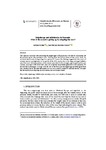Seigniorage and Inflation Tax in Romania: What Is the Executive Giving up by Adopting the Euro?

Ver/Abrir
Use este enlace para citar
http://hdl.handle.net/2183/27187
Excepto si se señala otra cosa, la licencia del ítem se describe como Atribución-NoComercial-SinDerivadas 4.0 España
Colecciones
- Investigación (FEE) [923]
Metadatos
Mostrar el registro completo del ítemTítulo
Seigniorage and Inflation Tax in Romania: What Is the Executive Giving up by Adopting the Euro?Fecha
2020Cita bibliográfica
Bodea, A. and Sánchez-Santos, J.M. (2020). Seigniorage and inflation tax in Romania. What is the executive giving up by adopting the euro? Scientific Annals of Economics and Business, 67(1), 75-91 DOI: 10.2478/saeb-2020-0004
Resumen
[Abstract] This paper is concerned with measuring the seigniorage in Romania since the fall of communism and
the potential gains after passing to euro. Starting from the balance sheet of the central bank, we
estimated these levels of seigniorage for a period of 27 years. Our findings suggest that this source of
revenue was at very high rates in the period of the 90’s, mostly due to the huge prolonged inflation
rates. Ever since the independence of the central bank, these levels of seigniorage dropped and became
constant, at around 1-2% of the GDP. Also, we computed the potential gains due to euro adoption. We
showed that as Romania converge with the rest of the Eurozone its seigniorage potential gains from
euro adoption drops. Because these gains are only very small in relation to national income, we argue
that the implications of giving up own currency are not budget related.
Palabras clave
Seigniorage
Inflation tax
Monetary policy
Euro adoption
Romania
Inflation tax
Monetary policy
Euro adoption
Romania
Versión del editor
Derechos
Atribución-NoComercial-SinDerivadas 4.0 España
ISSN
2501-1960






